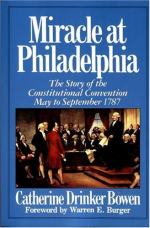
|
| Name: _________________________ | Period: ___________________ |
This test consists of 15 multiple choice questions and 5 short answer questions.
Multiple Choice Questions
1. Who is Washington's aide-de-camp during the Revolutionary War?
(a) Madison.
(b) King.
(c) Gerry.
(d) Hamilton.
2. Which delegate is called "The Tall Boy" during the Continental Congress?
(a) Governor Morris.
(b) Elbridge Gerry.
(c) Thomas Jefferson.
(d) Rufus King.
3. Chapter Five describes which Virginia Resolve that is considered at the beginning of June?
(a) The ability for the President to veto measures.
(b) The institution of a national executive.
(c) The method of representation within the legislature.
(d) The ability for Congress to tax the states.
4. Who is elected secretary of the Convention?
(a) Major Jackson of South Carolina.
(b) Alexander Hamilton of New York.
(c) Robert Morris of Pennsylvania.
(d) James Madison of Virginia.
5. Which issue tie up the Convention proceedings for days?
(a) How states elect members of the Senate.
(b) How states are to be governed.
(c) How states are allowed to veto Congressional decisions.
(d) How states are to be represented in Congress.
6. Where does the Convention meet?
(a) Washington, D.C..
(b) The Pennsylvania State House.
(c) The Congressional buildings.
(d) The White House.
7. What does Madison consider to be the usefulness of the Senate?
(a) The Senate is able to work more closely with the President because they have a similar perspective on American government.
(b) The Senate is able to discuss foreign matters with more authority because more Senators travel to Europe.
(c) The Senate is able to counteract the decisions made by a popularly elected branch of legislature.
(d) The Senate is able to make decisions with more coolness, systematic procedure, and wisdom than the popularly elected branch of legislature.
8. What American diversion does Chevalier de Chastelleux experience while in Connecticut?
(a) Hunting wild turkey.
(b) Squirrel hunting.
(c) Horse racing.
(d) Clearing timber for farmland.
9. What does Bedford declare the small states do if the large states dissolve the Confederation?
(a) Align themselves with one of the large states.
(b) Band together to form their own union.
(c) Find a foreign ally to assist them.
(d) Start a war against the large states.
10. What does Madison consider "a clear principle of free government"?
(a) The ability of anyone to run for legislative office.
(b) The announcement and publication of all government decisions.
(c) The ability of the people to elect at least one branch of the legislature.
(d) Voting rights for everyone, regardless of status.
11. Why does New Hampshire delay in sending delegates to the Convention?
(a) There are no delegates elected until after the Convention begins.
(b) The state government does not agree with the premises of the Convention.
(c) The delegates are all participating in the Congressional session.
(d) There is no money in the treasury to pay expenses.
12. What is important about the reading of state credentials?
(a) The state credentials reveal signs of the way the states are thinking at the start of the discussion.
(b) The state credentials allow the delegates to introduce themselves, because they are all strangers.
(c) Reading the state credentials give everyone a chance to get used to the regional differences in speech and accent.
(d) Reading the state credentials make the actions legal under the Articles of Confederation.
13. Which delegate took the most comprehensive notes on the Convention meeting?
(a) Franklin.
(b) Washington.
(c) Madison.
(d) Morris.
14. At the beginning of the Convention, Governor Morris reads a letter from whom?
(a) Thirteen delegates from New Hampshire.
(b) Thirteen officers from Cincinnati.
(c) Thirteen Congressmen.
(d) Thirteen merchants from Rhode Island.
15. What reason does Mason give as Hamilton's reason for leaving the Convention?
(a) He is angry that his opinions are not considered in the discussions.
(b) He is mortified that other New York delegates don't vote with him.
(c) He is opposed to the decisions being made at the Convention.
(d) He has pressing family business to tend to.
Short Answer Questions
1. On June 19th, which delegate begins the day by arguing against the New Jersey Plan?
2. How does Washington get his title of Commander in Chief?
3. Why is Thomas Jefferson absent from the Convention?
4. Which delegate from South Carolina claims to have a plan similar to that presented by Edmund Randolph?
5. On May 30th, what amendment to the Virginia Resolves is proposed by Randolph?
|
This section contains 770 words (approx. 3 pages at 300 words per page) |

|




